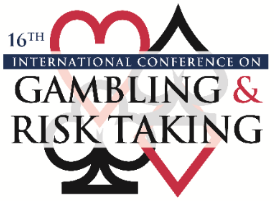Submission Title
Session Title
Session 3-2-E: Assessing Risk and Harm among Problem Gamblers
Presentation Type
Event
Location
The Mirage Hotel & Casino, Las Vegas, Nevada
Start Date
9-6-2016 10:30 AM
End Date
9-6-2016 12:00 PM
Disciplines
Economics | Gaming and Casino Operations Management | Hospitality Administration and Management | International Business | Mental and Social Health | Psychology | Public Affairs, Public Policy and Public Administration | Sociology | Statistics and Probability | Substance Abuse and Addiction | Tourism and Travel
Abstract
The majority of gambling research has been concentrating on problem gambling and on the association between gambling behavior, game design and gambling harm. Much less attention has been directed at recreational gambling or on players that do not suffer from any gambling related problems. However, when it comes to preventing gambling harm we should also target those at risk as well those who are gambling moderately.
As a part of a project on prevention of adult gambling harm we did a study of at-risk gamblers in order to recognize and to define the socio-economic background of our target group. Prior to our study there have been no examinations done on at-risk or moderate gamblers in Finland. The study was based on the Finnish national prevalence study 2011 data and the report was published in November 2015.
Our study also examined whether it is possible to identify at-risk gambling habits by analyzing gambling consumption. Previous studies identify an association between gambling consumption and gambling harm. It seems that we do need more research done on moderate and at-risk gamblers. Their gambling habits are not similar with those of problem gamblers and there seems to be demographic differences in these groups as well.
We have defined at-risk gambler as a gambler who gambles often and uses excessive amount of time and/or money, gambles usually a variety of games and who (possibly) experiences some adverse symptoms in his own economy, health, social relationships, at work or school due to his gambling. Recreational gambler was defined as a gambler who has not experienced any adverse symptoms due to his gambling. Gambling behavior is classified in our report by using PGSI on a three stage scale and was referred as:
-
0 points; moderate/recreational gambler (experience no problems)
-
1-4 points; at-risk gambler
-
5-27 points; problem gambler (including both moderate-risk gambler and problem gambler)
We took into account only those who had gambled.
In his presentation we will explore the profile of at-risk gamblers compared to moderate gamblers. Does at-risk gambling bear resemblance more to moderate gambling or to problem gambling? We will also discuss means of recognizing and screening at-risk gamblers.
Keywords
Gambling, at-risk gambler, recreational gambler, screening, problem gambling, moderate gambler, gambling harm
Included in
Economics Commons, Gaming and Casino Operations Management Commons, International Business Commons, Psychology Commons, Public Affairs, Public Policy and Public Administration Commons, Sociology Commons, Statistics and Probability Commons, Substance Abuse and Addiction Commons, Tourism and Travel Commons
Profiling At-Risk Gamblers
The Mirage Hotel & Casino, Las Vegas, Nevada
The majority of gambling research has been concentrating on problem gambling and on the association between gambling behavior, game design and gambling harm. Much less attention has been directed at recreational gambling or on players that do not suffer from any gambling related problems. However, when it comes to preventing gambling harm we should also target those at risk as well those who are gambling moderately.
As a part of a project on prevention of adult gambling harm we did a study of at-risk gamblers in order to recognize and to define the socio-economic background of our target group. Prior to our study there have been no examinations done on at-risk or moderate gamblers in Finland. The study was based on the Finnish national prevalence study 2011 data and the report was published in November 2015.
Our study also examined whether it is possible to identify at-risk gambling habits by analyzing gambling consumption. Previous studies identify an association between gambling consumption and gambling harm. It seems that we do need more research done on moderate and at-risk gamblers. Their gambling habits are not similar with those of problem gamblers and there seems to be demographic differences in these groups as well.
We have defined at-risk gambler as a gambler who gambles often and uses excessive amount of time and/or money, gambles usually a variety of games and who (possibly) experiences some adverse symptoms in his own economy, health, social relationships, at work or school due to his gambling. Recreational gambler was defined as a gambler who has not experienced any adverse symptoms due to his gambling. Gambling behavior is classified in our report by using PGSI on a three stage scale and was referred as:
-
0 points; moderate/recreational gambler (experience no problems)
-
1-4 points; at-risk gambler
-
5-27 points; problem gambler (including both moderate-risk gambler and problem gambler)
We took into account only those who had gambled.
In his presentation we will explore the profile of at-risk gamblers compared to moderate gamblers. Does at-risk gambling bear resemblance more to moderate gambling or to problem gambling? We will also discuss means of recognizing and screening at-risk gamblers.

Comments
Attachment: PDF containing 14 slides